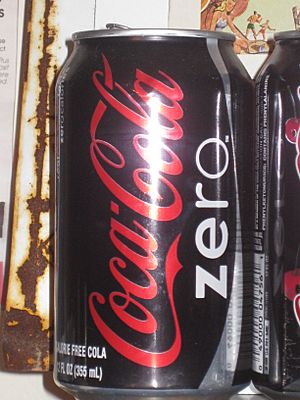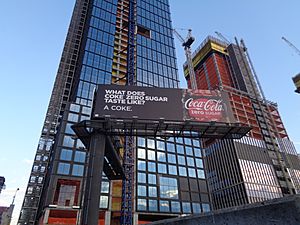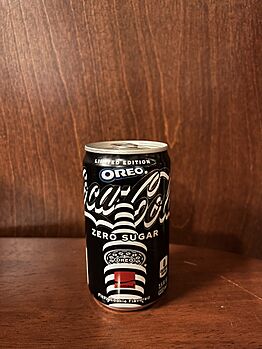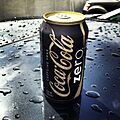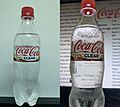Coca-Cola Zero Sugar facts for kids
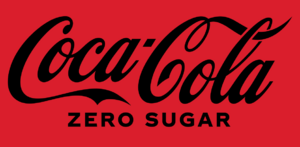 |
|
| Type | Diet cola |
|---|---|
| Manufacturer | The Coca-Cola Company |
| Country of origin | United States |
| Introduced | 2005 reformulated 2017 reformulated 2021 |
| Color | Caramel E150d |
| Flavor | Cola |
| Variants |
List
Coca-Cola Zero Cherry
Coca-Cola Zero Vanilla Coca-Cola Zero Cherry Vanilla Coca-Cola Zero Lemon Coca-Cola Zero Lime Coca-Cola Zero Raspberry Coca-Cola Zero Peach Coca-Cola Zero Orange Coca-Cola Zero Orange Vanilla Coca-Cola Zero Cinnamon Caffeine Free Coca-Cola Zero Coca-Cola Zero Starlight |
| Related products | Diet Coke |
Coca-Cola Zero Sugar, often called Coke Zero, is a popular diet cola made by The Coca-Cola Company. It has no sugar.
It first came out in 2005 as Coca-Cola Zero. It was a new cola with no calories. In 2017, the recipe changed, and its name became Coca-Cola Zero Sugar. Some people were not happy about this change. The recipe was updated again in 2021 in many countries, including the United Kingdom, United States, and Canada. Coke Zero is very popular. It is one of the top-selling sodas in the United States.
Contents
The Story of Coke Zero Sugar
Coca-Cola Zero Sugar was one of Coca-Cola's biggest new products in 22 years. The idea for this drink came from the company's team in Spain. It was advertised to taste almost exactly like regular Coca-Cola. This was different from Diet Coke, which has its own unique taste.
Changes in 2017
In 2017, even though sales were good, Coca-Cola decided to change Coca-Cola Zero. They renamed it Coca-Cola Zero Sugar. The goal was to make it taste even more like regular Coca-Cola. It also highlighted that it had no sugar. The new recipe was first tried in the United Kingdom in 2016.
Many fans were upset about this change. Some compared it to when "New Coke" was launched in 1985. However, experts said the taste was very similar. They believed the main change was the new name and packaging. In Australia, the drink was called "Coca-Cola No Sugar" in 2017. It took some time for people there to accept it.
In New Zealand, the original Coke Zero was still sold alongside Coke Zero Sugar for a while. The original Coke Zero was finally stopped in 2022. This happened when the 2021 recipe update came to New Zealand.
Changes in 2021
In July 2021, Coca-Cola announced another change to Coca-Cola Zero Sugar. This new recipe was already available in Europe and Latin America. The company said they would "improve existing flavors" without changing the ingredients list. The labels were also updated with a new look.
The Look of Coke Zero Sugar
The first Coca-Cola Zero logo usually had the red Coca-Cola writing. The word "zero" was below it in white letters on a black background. Later, the colors were swapped. The Coca-Cola writing became white, and "Zero" was red.
These words were often on a red circle with a black background. In Europe, the packaging looked more like classic Coca-Cola. It had a black band at the top that said "zero sugar." After the 2021 recipe change, the red circle was removed. The logo became black text on a red background. The background color changes for different flavors.
What's Inside Coke Zero Sugar
Coke Zero Sugar is made with several ingredients. These include:
- Carbonated water (bubbly water)
- Caramel color (for its brown color)
- Phosphoric acid (for a tart taste)
- Aspartame (a sweetener)
- Potassium benzoate (a preservative)
- Natural flavors (for the cola taste)
- Caffeine (a stimulant)
All versions of Coca-Cola Zero Sugar around the world use the same main flavor. They are all carbonated. One liter of Coca-Cola Zero Sugar has 96 milligrams of caffeine. Different countries might use slightly different combinations of sweeteners and preservatives. For example, in the U.S., it uses aspartame and acesulfame potassium as sweeteners. Diet Coke only uses aspartame.
Scientists have studied aspartame and acesulfame potassium. They have found that these sweeteners are safe to consume.
How Coke Zero Sugar is Advertised
Coke Zero was first advertised to men. This was because "diet" drinks were often seen as being for women. In the U.S., ads called it "calorie-free" instead of "diet." This was to appeal more to young men. The ads also stressed that it tasted very similar to regular Coca-Cola. One ad campaign showed Coca-Cola bosses being angry. They joked about suing their co-workers for "taste stealing."
In Australia, the launch was promoted in a tricky way. It involved fake online posts and graffiti. When this was found out, people said the campaign was misleading.
Coca-Cola Zero sponsors some sports events. These include the Bundesliga club Borussia Dortmund and the NASCAR Cup Series Coke Zero Sugar 400 race. It also sponsors the Suzuka 8 Hours motorcycle race in Japan.
In 2013, Coca-Cola changed the labels on bottles and cans in Europe. They put 150 popular local names on them for a "Share a Coke" campaign. This campaign was also used in North America the next summer.
For Christmas 2013, Coke Zero launched a fun website. People could design their own Christmas sweaters. The top 100 designs with the most votes were made into real sweaters. These were sent to the winners. The website got almost 42,000 sweater designs in just four days.
Different Kinds of Coke Zero Sugar
There are many different flavors of Coca-Cola Zero Sugar.
Standard Flavors
| Name | When it Started | Notes | Photo |
|---|---|---|---|
| Coca-Cola Cherry Zero Sugar | 2007 | This is Coca-Cola Zero Sugar with a cherry flavor. It first came out in the United States in 2007. It was launched in the UK in 2014. | 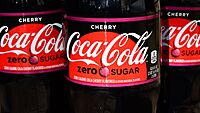 |
| Coca-Cola Vanilla Zero Sugar | 2007 | This has an added vanilla flavor. It was introduced in the US in 2007. It has also been sold in Australia, New Zealand, and Canada. | |
| Coca-Cola Zero Sugar Zero Caffeine | 2010 | This is Coca-Cola Zero Sugar without any caffeine. It was first released in France in 2010. It came to the US in 2013. | 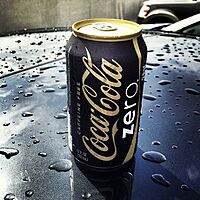 |
| Coca-Cola Lemon Zero Sugar | 2017 | This has an added lemon flavor. It has been sold in many European countries since 2017. | 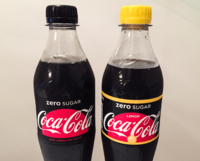 |
| Coca-Cola Peach Zero Sugar | 2018 | This is Coca-Cola Zero Sugar with a peach flavor. It was released in the United Kingdom in 2018. | |
| Coca-Cola Clear | 2018 | This is a clear version of Coca-Cola Zero Sugar. It has a hint of extra lemon. It was released in Japan in 2018. | 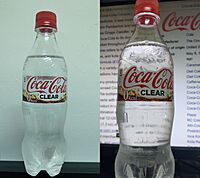 |
| Coca-Cola Raspberry Zero Sugar | 2018 | This has a raspberry flavor. It was released in Norway in 2018. | |
| Coca-Cola Cinnamon Zero Sugar | 2018 | This has an extra cinnamon flavor. It was released in the United Kingdom and other countries in 2018 for Christmas. | |
| Coca-Cola Stevia No Sugar | 2018 | This version used stevia as its only sweetener. It replaced Coca-Cola Life in New Zealand in 2018. | |
| Coca-Cola Orange Vanilla Zero Sugar | 2019 | This has orange and vanilla flavors. It became available across the United States in 2019. | |
| Coca-Cola Energy Zero Sugar | 2019 | This is Coca-Cola Zero Sugar with ingredients found in other energy drinks. It launched in Hungary and Spain in 2019. | |
| Coca-Cola Lime Zero Sugar | 2019 | This has a lime flavor. It is available in the United Kingdom and other countries. | |
| Coca-Cola Cherry Vanilla Zero Sugar | 2020 | This has cherry and vanilla flavors. It was released in the United States in 2020. | |
| Coca-Cola Orange Zero Sugar | 2020 | This has an orange flavor. It is available in Poland, Hungary, and other countries. | |
| Coca-Cola Zero Mango | 2020 | This has a mango flavor. It is available only in Israel. | |
| Coca-Cola Zero Calories Lemon-Lime | 2021 | This has a lemon and lime flavor. It is available only in Jordan. |
Coca-Cola Creations
These are special, limited-edition flavors of Coca-Cola Zero Sugar. They often have unique themes.
| Name | When it Started | Notes | Photo |
|---|---|---|---|
| Coca-Cola Starlight Zero Sugar | 2022 | This has a mysterious "space-inspired" flavor. It was a limited edition. | 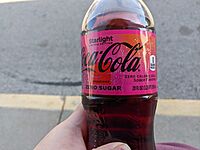 |
| Coca-Cola Marshmello Zero Sugar | 2022 | This flavor has watermelon and strawberry. It was made with the music producer Marshmello. | 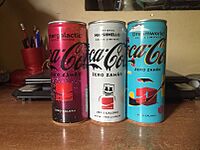 |
| Coca-Cola Dreamworld Zero Sugar | 2022 | This has a mystery "dreams-inspired" flavor. |  |
| Coca-Cola Movement Zero Sugar | 2023 | This has a mystery "transformation" flavor. It was made with Rosalía. | |
| Coca-Cola Ultimate Zero Sugar | 2023 | This has a mystery "+XP" flavor. It was made with League of Legends game maker Riot Games. | 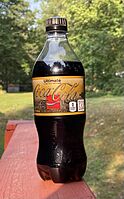 |
| Coca-Cola 3000 Zero Sugar | 2023 | This has a "future-inspired" flavor. It was created with the help of AI. | |
| Coca-Cola Zero Sugar OREO® | 2024 | This has an OREO® flavor. It was available for a limited time in the United States and the United Kingdom. It was part of a "Bestie for a Lifetime" campaign with OREO®. |
|
Images for kids


